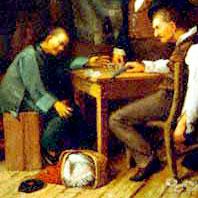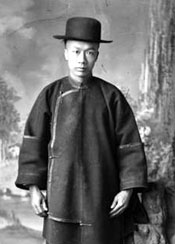|
"John Chinaman," anonymous. This song, published in The California Songster (San Francisco: Appleton, 1855), became popular during the California Gold Rush. |
|
John Chinaman, John Chinaman
I thought you'd open wide your ports I thought you'd cut your queue off, John, I imagined that the truth, John, I thought of rats and puppies, John, Oh, John, I've been deceived in you, |
Miners, Auburn Ravine, California, 1852. (California State Library); click to enlarge |
| Context: Chinese men arrived in significant numbers shortly after the Gold Rush began in California. Excluded from the best placer mines, Chinese miners frequently worked the "tailings" after Anglos and other European-Americans left a camp for better prospects elsewhere. Most Chinese, though, found work in services (cooking, laundering) and then in the construction of the transcontinental railroad during the 1860s. Anti-Chinese sentiment ran high in California: non-Chinese resented the "cheap labor" that Chinese men provided, while that same racism reinforced the very cheapness of Chinese labor. |
|
Taken from: Bret Harte, "The Heathen Chinee," Plain Language from Truthful James (Chicago: Western News, 1870), 33-35. |
|
Rufus Wright, "The Card Players," 1882, oil on canvas. (Oakland Museum of California); click to enlarge |
Which I wish to remark— Ah Sin was his name; It was August the third; Which we had a small game, Yet the cards they were stacked But the hands that were played Then I looked up at Nye, In the scene that ensued In his sleeves, which were long, Which is why I remark, |
|
Studio portrait of a Chinese-American man, between 1890 and 1920. (Library of Congress); click to enlarge |
|
| Context: Bret Harte, whose Overland Monthly we first encountered in reading Palmer's account of Virginia City, also wrote mediocre poetry. This 1870 poem was probably not meant as an anti-Chinese message (in fact, it was written simply as filler for a newspaper), but it became popular among those favoring Chinese exclusion from the United States. Later, Harte wrote the play Ah Sin with Mark Twain. |


